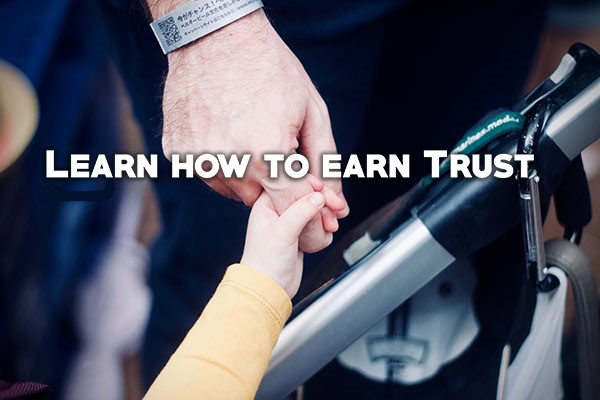How to build trust of someone important is the question faced by every individual. So how do we build trust? The sales person must gain the trust of the customer. The HR resources must gain the trust of the employees and management.
So how to gain trust? How to deploy training to gain trust for organization? How to earn trust, if I am an individual and I want to learn.
The drivers of trust are the attributes that lead to effective relationships. The cycle of trust is the process through which trust is formed and also sustained for a long period of time.
How to build trust?
Trust is very important for overall success and satisfaction. The success can be achieved only by working well with others in positive principled way.
By inspiring trust, you will encourage those around you to be cooperative and collaborative. Developing the drivers of trust and maintaining the trust of others will lead to productive business relationships.
The main drivers of trust are:
• Fairness
One of the key elements of trust is the fairness with which we treat others and conduct ourselves. Fairness is defined as impartial and just treatment or behavior without favoritism or discrimination with others.
• Dependability
Dependability is defined as the quality of being able to be relied and counted upon. When you mostly do everything that you say you will and never make promises you cannot keep.
• Respect
Respect is a positive feeling or action with you show towards someone or something. You hold others in high esteem or regard. it also conveys a sense of admiration for good or valuable qualities; and it is also the process of honoring someone by exhibiting care, concern, or consideration for their needs or feelings.
• Openness
Openness is an all embracing concept that has emphasis on transparency and free, unrestricted access to knowledge and information, as well as collaborative or cooperative management and decision-making rather than a central authority
• Courage
It is our ability to sail through difficult situation. It is also the way we face unfairness and talk candidly about it. Courage means not avoiding situations where stakes and high but you are facing resistance.
• Unselfishness
The fact, no one is completely unselfish. Having said that, there is a reasonable amount of unselfishness we must demonstrate to gain trust. This can happen when we are not always self focus but take stalk of the situation the other person is. It is also about asking about well being of others, remembering their joyful moments and offer of help when they are in need.
• Competence
No matter how many other qualities you possess but competence in an area or the skills and abilities in the area in which the other person is interested in will enable you to gain their trust more quickly.
• Supportiveness
A friend in need is the friend indeed. Not only in challenging situation but even otherwise demonstrative supportiveness for even small activities or concern goes a long way to win trust.
• Empathy
Empathy is the capacity to understand or feel what another person is experiencing from within the other person’s frame of reference, i.e., the capacity to place oneself in another’s position.
• Compassion.
Compassion motivates people to go out of their way to help the physical, mental or emotional pains of another and themselves
• Consistency
Is is not only about doing something that is committed. It is also about being predictable and keep doing what you have committed. Research shows that people always favor consistency as a part of their primitive genetic makeup. This is because consistency meant safety for early humans.
By promoting these qualities, relationships with colleagues, customers and stakeholders are more beneficial to everyone involved.
The reality of trust
In reality, the attributes or qualities we are more likely to encounter are:
• Likability
• Dependability
• Critical
• Ambition
• Fairness
• Professionalism
• Competence
• Respect
• Controlling
• Predictability
The Trust Deficit
People look for the drivers of trust when deciding when, and how much, to trust someone. This is because when people’s expectations are not met, trust and entire relationship are seriously undermined.
It would seem that without a concerted effort to develop and demonstrate these qualities we are unlikely to develop the rapport we need for good working relationships. Avoiding a trust deficit becomes all-important if we are to get the most out of business relationships.
By understanding the drivers of trust, along with the cycle of trust, we can better shape the way we relate to others and build successful, reliable and productive relationships.
The Trust Cycle
Final Words
How to build trust is not a secret. There are well defined steps to build trust.
By continually following these stages, you will build and maintain the trust that is essential for effective, productive relationships. As trust is such a fragile commodity, failing to achieve any one of these stages will damage the relationship and require you to go back and rebuild it.
I would strongly recommend you to read about emotional intelligence and change curve to better equip with human behavior, emotional orientation and how to manage it, along with understanding psychology behind change.
For this reason, ensuring that trust is maintained – by continually developing the drivers of trust and following the cycle of trust – is less disruptive, less time-consuming and less stressful. It creates the positive and productive relationships that are necessary for success.


